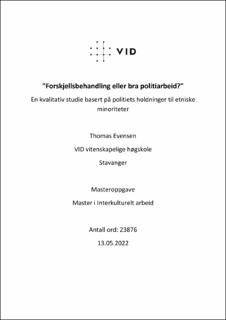| dc.contributor.author | Evensen, Thomas | |
| dc.date.accessioned | 2023-06-01T06:25:10Z | |
| dc.date.available | 2023-06-01T06:25:10Z | |
| dc.date.issued | 2022 | |
| dc.identifier.uri | https://hdl.handle.net/11250/3069544 | |
| dc.description.abstract | Denne masteroppgaven tar for seg politiets holdninger til etniske minoriteter og hvilke faktorer som kan påvirke disse holdningene. Masteroppgaven bygger på en kvalitativ studie som tar utgangspunkt i individuelle intervjuer med et utvalg politi som jobber i et politidistrikt på Vestlandet. Intervjuene antas og bidra til å belyse fordommer, ukultur og holdninger som eksisterer i politidistriktet. Det innhentede datamateriale er tolket gjennom et hermeneutisk og fenomenologisk forskningsperspektiv. Gjennom tematisk analyse ble datamaterialet delt opp i tre hovedkategorier. • Politiets syn på myndighetenes regelverk i forhold til etniske minoriteter • Politiets syn på etniske minoriteter og kriminalitet • Politiets holdninger til etniske minoriteter Hovedkategoriene representerer de spørsmålene som informantene ble stilt under intervjuene og danner utgangspunktet for drøftingene. • Et viktig forskningsspørsmål er hvordan politiet kan øke sin interkulturelle kompetanse for å forhindre forskjellsbehandling og subkultur. Studien viser at det er et klart fravær av grunnleggende interkulturell kompetanse i politiet. Manglende flerkulturelle forståelse, frykt for rasismebeskyldninger og medieoppmerksomhet rundt politiets opptreden, ser ut til å gjøre politiet passive i situasjoner der etniske minoriteter er representert. Denne passiviteten handler i all
hovedsak om frykt og konsekvenser for å gjøre feil. Videre viser studien at politiets håndhevelse og utførelse bruk av måltall kan føre til at etniske minoriteter blir forskjellsbehandlet og at dette kan gå ut over rettssikkerheten. Vi ser også tegn på at det kan utvikles sub-kulturer i politiet som ubevisst kan ha innvirkning på hvordan politiet møter minoritetene på. Disse sub-kulturene kan imidlertid forebygges med gode holdninger blant ledere og eldre tjenestepersoner, samt etablering av trygge arbeidsmiljø hvor det er rom for å korrigere uønsket adferd. Avslutningsvis har jeg kommet med konkrete anbefalinger for
hvordan politiet kan å øke den interkulturelle kompetansen blant ansatte i etaten. | en_US |
| dc.description.abstract | This study is about the Norwegian polices attitudes towards ethnic minorities, and which factors that affect police behavior. The master`s thesis is based on a qualitative study of individual interviews with six police officers in a police district in the western part of Norway. The interviews will presumably contribute to highlight prejudice, subculture and police attitudes that exists within the police district. The data material is interpreted thorough a hermeneutic and a phenomenological research perspective. The analysis method was thematic analysis, and the data material was organized in to three main categories. • Police view on the authority's regulations around ethnical minorities • Police view on ethnic minorities and crime
• Police attitudes towards ethnic minorities The main categories represent the questions that the nformants were asked during the interviews, and forms a starting point for the discussions towards elevant theory. • One important research question is how the police can increase their intercultural competence in order to prevent discrimination and sub culture. The study shows that it`s a clear absence of basic multicultural competence in the police. The lack of intercultural competence, accusations of racism, and media attention toward police conduct, makes the police passive in situations were ethnic minorities are
represented. The reason for the passivity is mainly because the police is afraid for making mistakes, and the consequences that follows. The study also shows that use of target figures can lead to discrimination and further on have consequences for the rule of law. It can develope subcultures within the police that can have an effect om how police perceive ethnic minorities. However, these subcultures can be revented with good attitudes among leaders and older officials, as well as establishing safe work environment where correcting unwanted behavior is accepted at all levels. Finally, I've made recommendations on how the police can establish a better multicultural competence and why this is so important | en_US |
| dc.language.iso | nob | en_US |
| dc.rights | Attribution-NonCommercial-NoDerivatives 4.0 Internasjonal | * |
| dc.rights.uri | http://creativecommons.org/licenses/by-nc-nd/4.0/deed.no | * |
| dc.subject | interkulturell kompetanse | en_US |
| dc.subject | stereotyper | en_US |
| dc.subject | rasisme | en_US |
| dc.subject | fordommer | en_US |
| dc.title | "Forskjellsbehandling eller bra politiarbeid?" En kvalitativ studie basert på politiets holdninger til etniske minoriteter | en_US |
| dc.type | Master thesis | en_US |
| dc.description.version | publishedVersion | en_US |
| dc.source.pagenumber | 84 | en_US |

